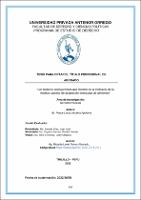Mostrar el registro sencillo del ítem
Los factores socio jurídicos que inciden en la ineficacia de la medida cautelar de asignación anticipada de alimentos
| dc.contributor.advisor | Torres Alvarado, Ricardo Lenin | |
| dc.contributor.author | Ponce Leiva, Micaela Apolonia | |
| dc.creator | Ponce Leiva, Micaela Apolonia | |
| dc.date.accessioned | 2022-11-29T12:58:56Z | |
| dc.date.available | 2022-11-29T12:58:56Z | |
| dc.date.issued | 2022 | |
| dc.identifier.uri | https://hdl.handle.net/20.500.12759/9762 | |
| dc.description.abstract | La investigación denominada “los factores socio jurídicos que inciden en la ineficacia de la institución jurídica de asignación anticipada de alimentos”; nace en aquellos procesos judiciales de alimentos en donde la tramitación paralela de la medida cautelar de asignación anticipada termina siendo ineficaz por diversos factores. Ante ello, se formuló el enunciado: ¿Cuáles son los factores socio – jurídicos que inciden en la ineficacia de la institución jurídica de asignación anticipada de alimentos? Los métodos utilizados en la investigación fueron de tipo lógico y jurídico. El primero, se desarrolló a través del tipo estadístico, deductivo e inductivo. El segundo, se desarrolló a través del tipo dogmático, hermenéutico y comparativo. Las técnicas utilizadas en la investigación fueron; el análisis documental de doctrina y normativa civil del ámbito procesal civil y familiar, y, la encuesta. Ambas técnicas se realizaron mediante instrumentos como el protocolo de análisis y el cuestionario. Los resultados de la investigación son óptimos, ya que están relacionados con los objetivos planteados y corroboran la hipótesis propuesta, obteniendo como principales conclusiones las siguientes: Existen factores de orden jurídico y social que determinan que la asignación anticipada no logre su finalidad y por tanto resulte ineficaz; los factores jurídicos que inciden en la ineficacia de la asignación anticipada son: la inaplicación de medidas cautelares alternativas, la formalidad del requerimiento de copias y la formación del cuaderno cautelar; y, la demora de los plazos procesales en la ejecución de la medida cautelar y los factores sociales que inciden en la ineficacia de la asignación anticipada son: la inadecuada gestión jurídica del abogado patrocinador, la idiosincrasia del deudor; y, la informalidad del trabajo y la condición del trabajador demandado como independiente; y, los factores jurídicos y sociales tienen una relación de causa – efecto respecto a la ineficacia de la asignación anticipada, y conllevan a la vulneración del debido proceso y la tutela jurisdiccional efectiva. | es_PE |
| dc.description.abstract | The research called ““the socio-legal factors that affect the inefficiency of the legal institution of advance allocation of food““; It arises in those judicial food processes where the parallel processing of the precautionary measure of advance allocation ends up being ineffective due to various factors. Given this, the statement was formulated: What are the socio-legal factors that affect the legal institution of advance allocation of food? The methods used in the investigation were logical and legal. The first was developed through the statistical, deductive and inductive type. The second developed through the dogmatic, hermeneutical and comparative type. The techniques used in the investigation were; the documentary analysis of doctrine and civil regulations of the civil and family procedural field, and, the survey. Both techniques were performed using instruments such as the analysis protocol and the questionnaire. The results of the investigation are optimal, they are already related to the stated objectives and corroborate the proposed hypothesis, obtaining the following main conclusions: There are legal and social factors that determine that the anticipated allocation does not achieve its purpose and therefore it is ineffective ; The legal factors that affect the ineffectiveness of the advance assignment are: the non-application of alternative precautionary measures, the formality of the request for copies and the formation of the precautionary notebook, and the delay in the procedural terms in the execution of the precautionary measure and The social factors that affect the ineffectiveness of the advance assignment are: the inadequate legal management of the sponsoring lawyer, the idiosyncrasy of the debtor, and the informality of the work and the condition of the worker being sued as independent; and, the legal and social factors have a cause-effect relationship with respect to the ineffectiveness of the advance assignment, and lead to the violation of due process and effective jurisdictional protection. | en_US |
| dc.description.uri | Tesis | es_PE |
| dc.format | application/pdf | es_PE |
| dc.language.iso | spa | es_PE |
| dc.publisher | Universidad Privada Antenor Orrego | es_PE |
| dc.relation.ispartofseries | T_DERE_583 | |
| dc.rights | info:eu-repo/semantics/openAccess | es_PE |
| dc.rights.uri | https://creativecommons.org/licenses/by/4.0/ | es_PE |
| dc.source | Universidad Privada Antenor Orrego | es_PE |
| dc.source | Repositorio Institucional - UPAO | es_PE |
| dc.subject | Asignacion Anticipada | es_PE |
| dc.subject | Factores Socio Jurídicos | es_PE |
| dc.title | Los factores socio jurídicos que inciden en la ineficacia de la medida cautelar de asignación anticipada de alimentos | es_PE |
| dc.type | info:eu-repo/semantics/bachelorThesis | es_PE |
| thesis.degree.level | Título Profesional | es_PE |
| thesis.degree.grantor | Universidad Privada Antenor Orrego. Facultad de Derecho y Ciencias Politicas | es_PE |
| thesis.degree.name | Abogado | es_PE |
| thesis.degree.discipline | Derecho | es_PE |
| dc.subject.ocde | https://purl.org/pe-repo/ocde/ford#5.05.00 | es_PE |
| renati.advisor.orcid | https://orcid.org/0000-0002-2274-2211 | es_PE |
| renati.author.dni | 46539719 | |
| renati.advisor.dni | 16796656 | |
| renati.type | https://purl.org/pe-repo/renati/type#tesis | es_PE |
| renati.level | https://purl.org/pe-repo/renati/level#tituloProfesional | es_PE |
| renati.discipline | 421016 | es_PE |
| renati.juror | Estrada Díaz, Juan José | |
| renati.juror | Zegarra Arévalo, Ronald Manolo | |
| renati.juror | Silva Chinchay, Leiby Milagros | |
| dc.publisher.country | PE | es_PE |
Ficheros en el ítem
Este ítem aparece en la(s) siguiente(s) colección(es)
-
Derecho [477]


